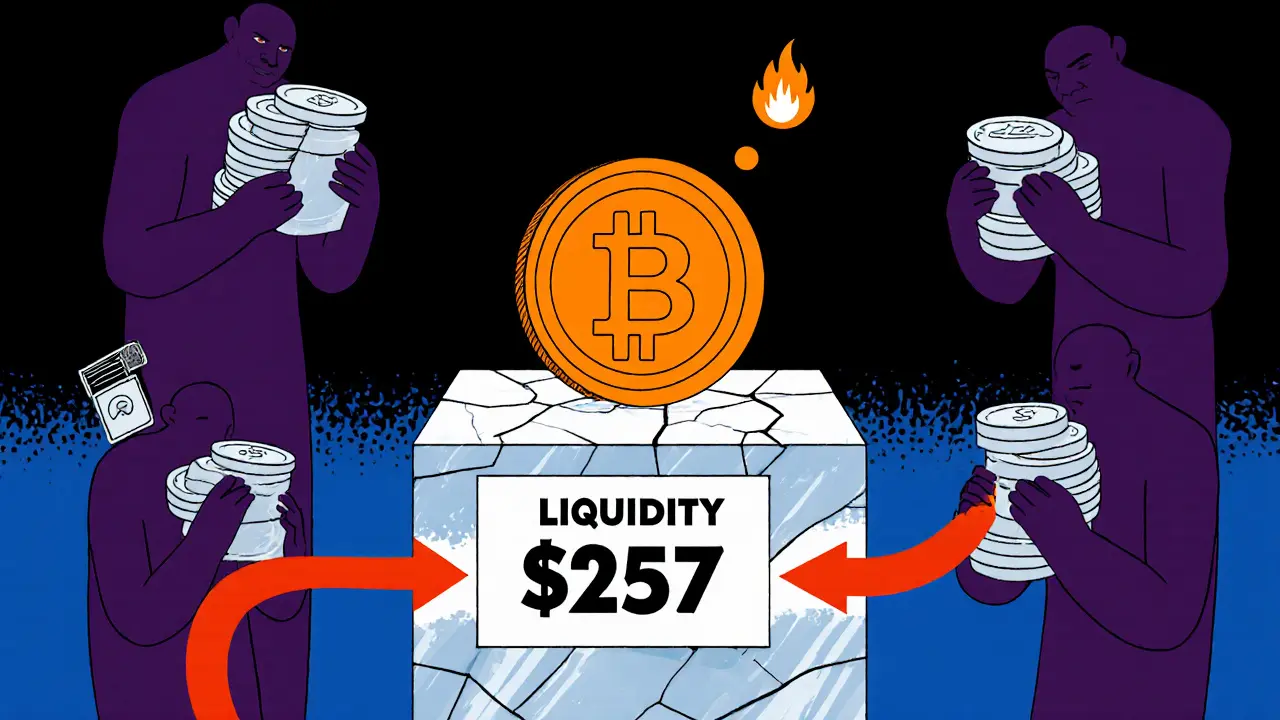HOA Liquidity Risk Calculator
Trade Risk Assessment
Enter your trade amount to see potential slippage based on HOA's current liquidity of $257. Warning: HOA has extreme liquidity risk - a $100 trade can cause ~39% price movement.
HOA Current Data (as of Oct 2023):
- Current Liquidity: $257
- Price: $0.0037 per token
- Top 10 wallets hold 87% of supply
Key Takeaways
- Hex Orange Address (HOA) is a meme‑style token built on the PulseChain network.
- It has a fixed supply of ~151.8 million, with ~150 million currently circulating.
- Liquidity is extremely thin - roughly a few hundred dollars on its main pair - making large trades risky.
- The token carries no intrinsic utility, no audit, and a high‑risk rating from multiple analysts.
- Buying HOA requires a PulseChain‑compatible wallet, a bridge (if you come from Ethereum), and a tolerance for price swings.
What Is Hex Orange Address (HOA)?
When you first see the name, the orange‑themed branding can be confusing. Hex Orange Address (HOA) is a meme cryptocurrency that launched within the PulseChain ecosystem in 2023. The project’s team remains anonymous, and the only official documentation is the so‑called “Orange Paper,” which describes HOA as a “peel‑to‑peel electronic cash system” meant for fee‑free peer‑to‑peer transfers.
HOA’s tagline - “no fees, no taxes, just orange” - underscores its promise of zero transaction costs. In practice, the token relies on the PulseChain network’s native gas mechanics, so users still pay the chain’s standard gas fee (about 0.001 PLS per transaction).
How HOA Works on a Technical Level
HOA follows the standard ERC‑20 token model, but it runs on PulseChain’s EVM‑compatible environment. Below are the core specs:
- Network: PulseChain (a fork of Ethereum with faster block times - roughly 13 seconds per block).
- Total supply: 151,811,475 HOA.
- Circulating supply (Oct 2023): 149,995,459 HOA.
- Contract address: 0x… (PulseChain address, not an Ethereum address).
- Transaction fee: 0 % token tax; only standard network gas applies.
The token includes a simple “buy‑and‑burn” mechanism: a portion of any platform‑level fees (like exchange fees) is used to repurchase HOA on the open market and send it to a burn address. No independent audit has verified that the burns actually happen, which is a major red flag for investors.

Market Snapshot & Recent Performance
HOA is a low‑cap asset. As of 20 Oct 2023, its market cap sat around $560 k, ranking #5,608 on CoinMarketCap. The daily trading volume is roughly $5,300, compared with Dogecoin’s $1.5 billion. On 19 Oct 2023, Kraken listed HOA at $0.0037 per token.
Liquidity is razor‑thin. LiveCoinWatch reported only $257 of liquidity on the primary HOA/PLS pair, which means a $200 buy order can slip 15‑20 % beyond the quoted price. The top 10 wallets control 87 % of the supply, creating a concentration risk where a single holder could dump a large chunk and crash the price.
Price history shows a steep decline from an all‑time high of $0.18 in January 2023 to the current $0.0037 - a 96 % loss, far worse than the broader crypto market’s average drawdown of 78 % during the same period.
Risks, Red Flags, and Community Sentiment
Multiple analytics firms rate HOA as high‑risk:
- CoinDesk’s meme‑coin report gave it a 92/100 risk score.
- Delphi Digital’s analyst called it “the most problematic meme coin” due to zero utility and opaque burn tactics.
- CoinGecko’s suitability rating is 1.8/5, citing insufficient liquidity and lack of development activity.
Community sentiment is split. Reddit’s r/PulseChain threads show about 68 % negative comments, focusing on “zero utility” and “impossible to sell.” In contrast, the official Telegram group (≈1,800 members) maintains an upbeat tone, with members posting “to the moon” memes and reporting early short‑term gains.
Key risk factors to keep in mind:
- Liquidity crunch: Thin order books mean you might not be able to exit a position.
- Concentrated holdings: A handful of wallets can manipulate price.
- No audits: Smart‑contract code has never been vetted by CertiK, OpenZeppelin, or similar firms.
- Limited utility: No merchant acceptance, no staking, no real‑world use cases.
How to Acquire and Store HOA Safely
If you decide to take the plunge, the process is straightforward but requires attention to a few details:
- Set up a PulseChain‑compatible wallet (e.g., MetaMask configured for PulseChain or the native PulseWallet).
- Fund the wallet with a small amount of PLS to cover gas fees.
- If you own HOA on Ethereum, use a bridge (such as the official PulseBridge) to move the tokens to PulseChain.
- Swap PLS for HOA on a decentralized exchange that lists the pair - PulseX is the most common.
- Optionally add the HOA contract address to your wallet manually to see the balance.
Because of the token’s low liquidity, it’s wise to start with a tiny position (under $50) and test the withdrawal flow before committing larger sums.

HOA vs. Other Meme Coins
| Metric | Hex Orange Address (HOA) | Dogecoin (DOGE) | Shiba Inu (SHIB) |
|---|---|---|---|
| Launch year | 2023 | 2013 | 2020 |
| Underlying blockchain | PulseChain | Bitcoin (merged‑mined) | Ethereum |
| Current price (Oct 2023) | $0.0037 | $0.075 | $0.000015 |
| 24‑hr volume | $5,300 | $1.5 B | $250 M |
| Liquidity (primary pair) | ~$257 | ~$650 M | ~$30 M |
| Audit status | No public audit | Audited by multiple firms | Audited (OpenZeppelin) |
| Community size (Telegram) | ~1,800 members | ~150,000 members | ~200,000 members |
The table makes it clear why HOA is considered a high‑risk micro‑cap: its liquidity and community are dwarfed by the more established meme coins, and it lacks basic security assurances.
Frequently Asked Questions
What blockchain does HOA run on?
HOA is deployed on PulseChain, an Ethereum‑compatible network with faster block times.
Is HOA audited by any security firm?
No reputable audit has been published for HOA. This lack of verification is one of the main red flags cited by analysts.
How can I buy HOA?
Set up a PulseChain‑compatible wallet, add some PLS for gas, then swap PLS for HOA on a DEX such as PulseX. You can also trade HOA on Kraken, which lists the token against USDT.
What are the main risks of holding HOA?
Thin liquidity, highly concentrated token holdings, no audit, zero real‑world use, and extreme price volatility are the top risks.
Does HOA have any utility beyond speculation?
At present, HOA’s only function is to act as a low‑fee transfer token within PulseChain. There are no merchant integrations, staking rewards, or governance mechanisms.
Bottom Line
Hex Orange Address (HOA) is a niche meme token that ticks the boxes of zero transaction tax and a playful brand, but it falls short on everything that matters for long‑term investors: solid liquidity, audited code, and real utility. If you’re looking for a high‑risk, speculative play and you understand the odds of getting stuck, a tiny position might satisfy the curiosity factor. For anyone seeking durability, security, or a real use case, more established assets such as Dogecoin or even PulseChain’s native token PLS are far safer bets.

Write a comment